Woman becomes first non-resident to die through Vermont's assisted suicide law

A woman diagnosed with terminal cancer was among the first out-of-state residents to hasten her death through Vermont's medical aid in dying law. The elderly woman claimed that she wanted a meaningful death, but not one where she died after a prolonged illness.
Lynda Bluestein, a 76-year-old Connecticut resident, sought to end her life through Vermont's assisted suicide law, which allows patients who have an illness that is likely to kill them within six months to take a lethal medication.
Bluestein, who had terminal cancer, died Thursday after receiving permission to die by assisted suicide in Vermont, even though she didn't live in the state.
In an email provided to The Associated Press, Bluestein's husband Paul told the assisted-suicide advocacy group Compassion & Choices that his wife's last words were, "'I'm so happy I don't have to do this (suffer) anymore.'"
The group had filed a lawsuit on Bluestein's behalf in 2022, and Dr. Diana Barnard, a Vermont physician, did so as well. The suit argued that the residency requirement violated the U.S. Constitution's guarantee of equal treatment.
In March, a settlement agreement stated that Bluestein could use Vermont's assisted suicide law to end her life, even though she was not a state resident. Two months later, Vermont amended its law to allow people from out-of-state to hasten their deaths, as the AP reported.
"Lynda was an advocate all the way through, and she wanted access to this law, and she had it, but she and everybody deserves to have access much closer to home because the need to travel and to make arrangements around the scheduling to come to Vermont is not something that we wish for people to have," Barnard said, as quoted by the AP.
"But more than a silver lining is the beauty and the peace that came from Lynda having a say in what happened at the very end of her life."
Bluestein didn't want to die like her mother, who passed away in a hospital bed after a prolonged illness. Last year, the elderly woman told the AP that she wanted to die surrounded by her family, friends, neighbors and dog.
Vermont's assisted suicide law has been in effect since 2013, and the original bill required patients with a terminal illness to make two in-person visit requests to a prescribing physician at least 15 days apart.
The state amended the law in 2022 to allow patients who meet specific criteria to request lethal medication without an in-person doctor visit. The bill, S.74, eliminated the requirement for the prescribing physician to perform a physical examination to determine if the patient suffers from a terminal condition.
Under S.74, healthcare providers and pharmacists aiding patients in suicide also have legal immunity.
According to a study published in November 2022 titled "Does Legalizing Assisted Suicide Make Things Better Or Worse?" nations that have legalized assisted suicide or euthanasia appear to have higher rates of "self-initiated" suicides. The report derived its conclusion from multiple studies in Europe and North America.
Wesley J. Smith, chair and senior fellow at the Discovery Institute's Center on Human Exceptionalism, told The Christian Post at the time that allowing suicide in some cases sends the message to people with thoughts of suicide that killing themselves is "proper."
"Assisted suicide advocacy is, literally, suicide advocacy, even if promoters deploy deflecting euphemisms such as, 'aid in dying,'" Smith said. "A society can't be pro-some suicides and then be surprised that some suicidal people outside the permitted categories think it includes them."
Samantha Kamman is a reporter for The Christian Post. She can be reached at: samantha.kamman@christianpost.com. Follow her on Twitter: @Samantha_Kamman




























